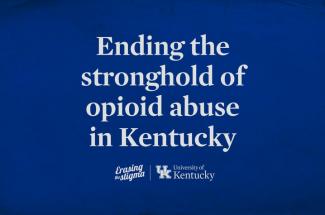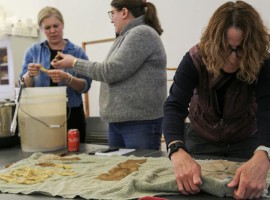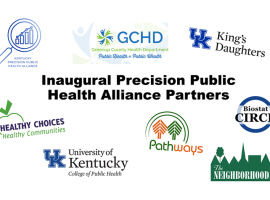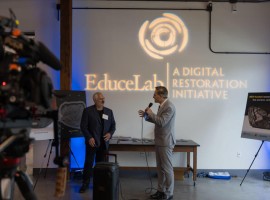UK Research, Programs Aim to Repair Destruction of Opioid Crisis

Experts from the University of Kentucky on Thursday provided education, insight and information about the opioid epidemic to the UK Board of Trustees, campus leaders and community members. During the daylong program, faculty from the Colleges of Medicine, Public Health, Nursing and various departments at UK HealthCare covered topics ranging from prevention, treatment and harm reduction and highlighted programs that have been established to improve access to evidence-based treatment for opioid use disorder (OUD).
Sharon Walsh, director of the Center on Drug and Alcohol Research (CDAR) and professor of Behavioral Science, began the day by providing an overview and introduction to the opioid epidemic. Though the topic has been covered heavily in the news, and many people have been directly impacted by opioid addiction, many don’t know where and when the problem began.
Attendees had the opportunity to hear from three survivors who have been directly impacted by the opioid crisis. Alex, Dan and Healther spoke candidly about their experiences in active addiction and their paths to recovery.
Targeting the opioid epidemic in various settings is key to ending the stranglehold of this disease on communities. The best approaches to this, was discussed by a panel that included Dr. Allen Brenzel, medical director for the Cabinet for Health and Family Services and associate professor of Psychiatry and Pediatrics at UK; Dr. Laura Fanucchi from the Division of Infectious Disease; Secretary John Tilley from the Kentucky Justice and Safety Cabinet; and Dr. Roger Humphries, chair of the UK Department of Emergency Medicine. The panel discussed how addiction medicine can be integrated into traditional health care settings such as through the First Bridge Clinic and through the new UK Addiction Consult Service. Secretary Tilley focused on the criminal justice system’s role in providing care and opportunities for recovery, rather than arresting our way through the epidemic, “we have to reframe this debate and move it away from the criminal justice system.”
As the director of CDAR, Walsh leads a team of faculty members who conduct research on various aspects of OUD. “Medicine should be practiced in an evidence-based way,” she said. Among CDAR faculty presenting were:
- Dr. Michelle Lofwall, associate professor of psychiatry, on research to develop new formulations and delivery methods of buprenorphine, one of the three medications used in evidence-based treatment of OUD.
- April Young, associate professor in the College of Public Health, with the Care2Hope study which is currently underway in Morehead. The study aims to reduce rates of HIV and Hepatitis C amongst people who inject drugs.
- Jennifer Havens, associate professor in the Department of Behavioral Science, who has led a study in Hazard to reduce rates of Hepatitis C through a treatment as prevention approach. Through a new NIH funded study, Havens will provide free treatment to community members who are chronically infected with Hepatitis C.
Information also was provided about how the opioid crisis affects entire communities and entire families. Through the Perinatal Assessment and Treatment Home (PATHways) and Beyond Birth programs, pregnant and newly-parenting women are given a chance. The program incorporates the best practices in the field, adhering to federal guidelines for office-based buprenorphine treatment across the spectrum of care for women, and provides a comprehensive treatment program for a highly vulnerable population with substance use disorders. Women and their families are supported and advocated for through continuous levels of care, ranging from intensive medical care to sustained recovery. UK HealthCare also has office-based opioid treatment programs, which link patients hospitalized with infections related to infectious diseases and chronic infections such as HIV. Dr. Agatha Critchfield, assistant professor of obstetrics and gynecology, and Kristin Ashford, professor and associate dean in the College of Nursing, discussed the program’s successes, the future and Beyond Birth’s upcoming expansion.
The opioid crisis is a multifaceted process impacting every aspect of society, Walsh said. "It’s disrupting families, economies, healthcare systems and communities but through an approach targeted at expanding access to treatment, improving prevention efforts, treating opioid use disorder as the disease that it is and reducing rates of the infectious diseases associated with OUD we can begin to turn the tide on this epidemic and heal our Commonwealth and nation."




